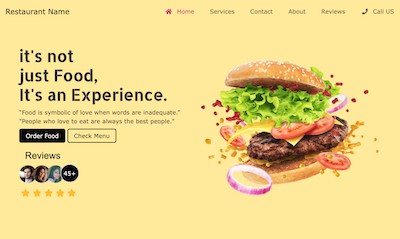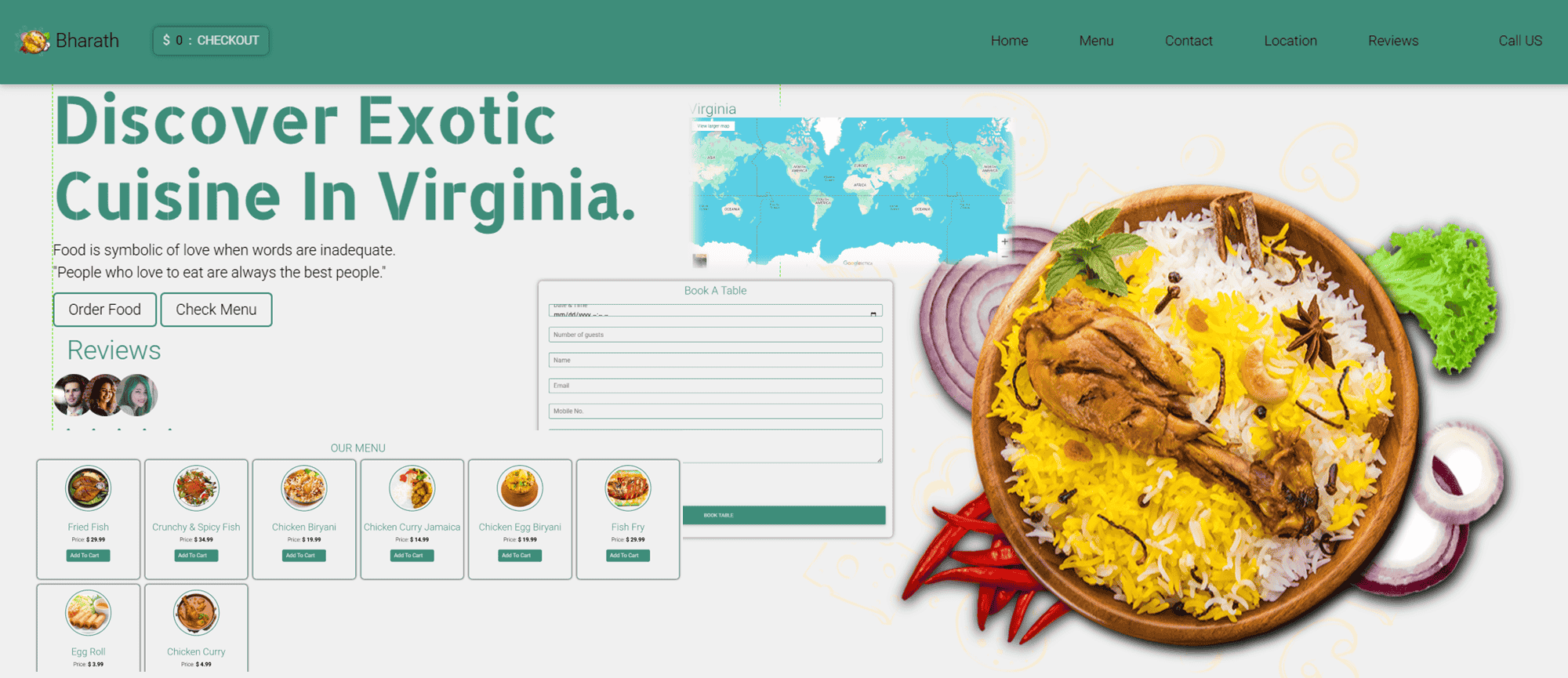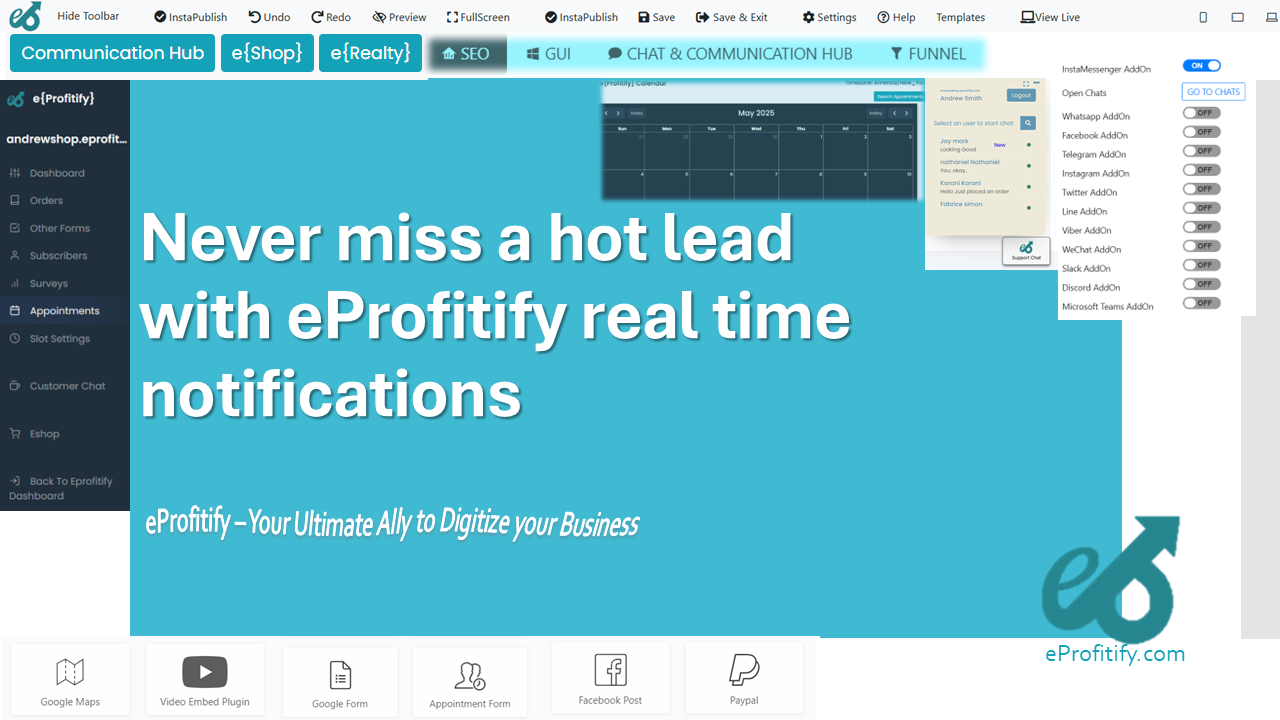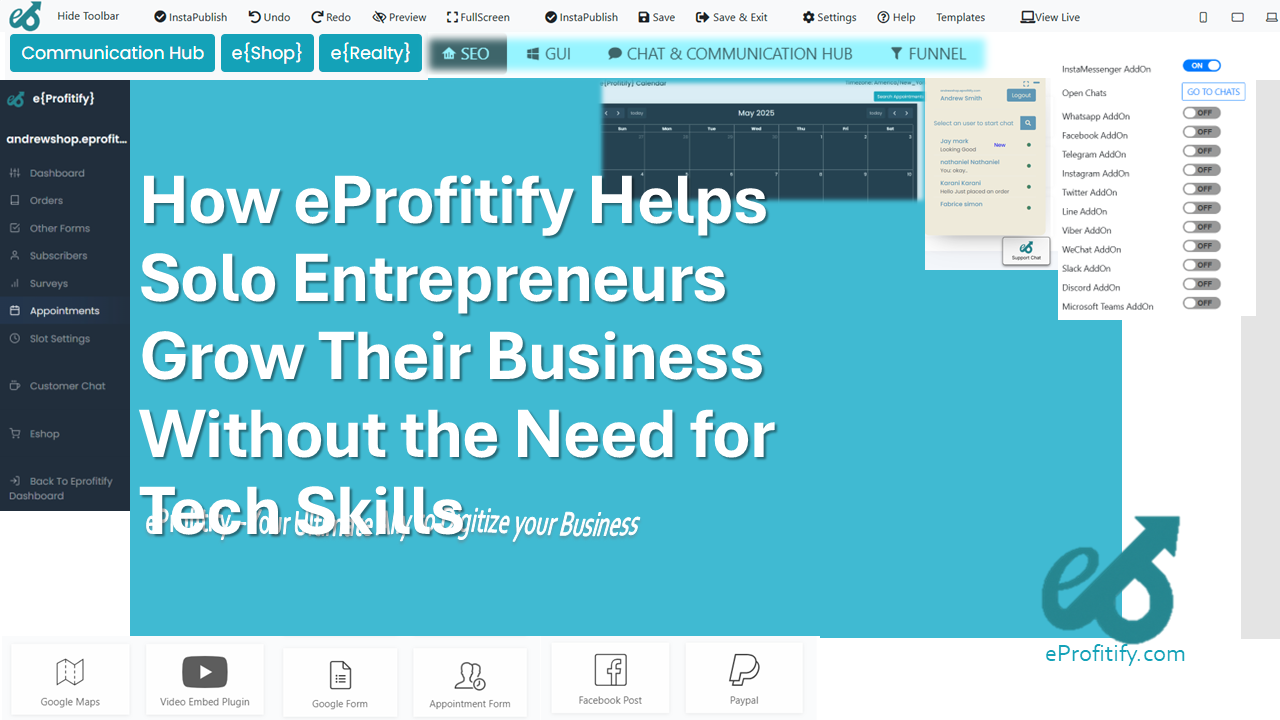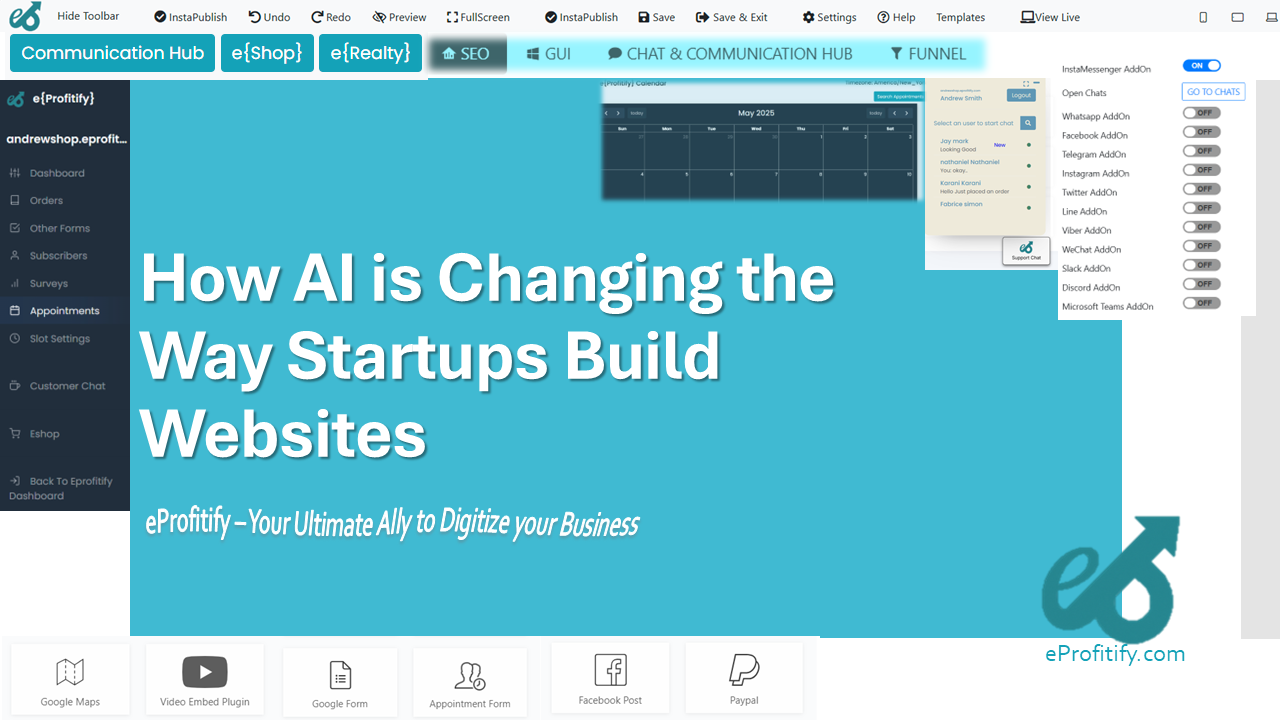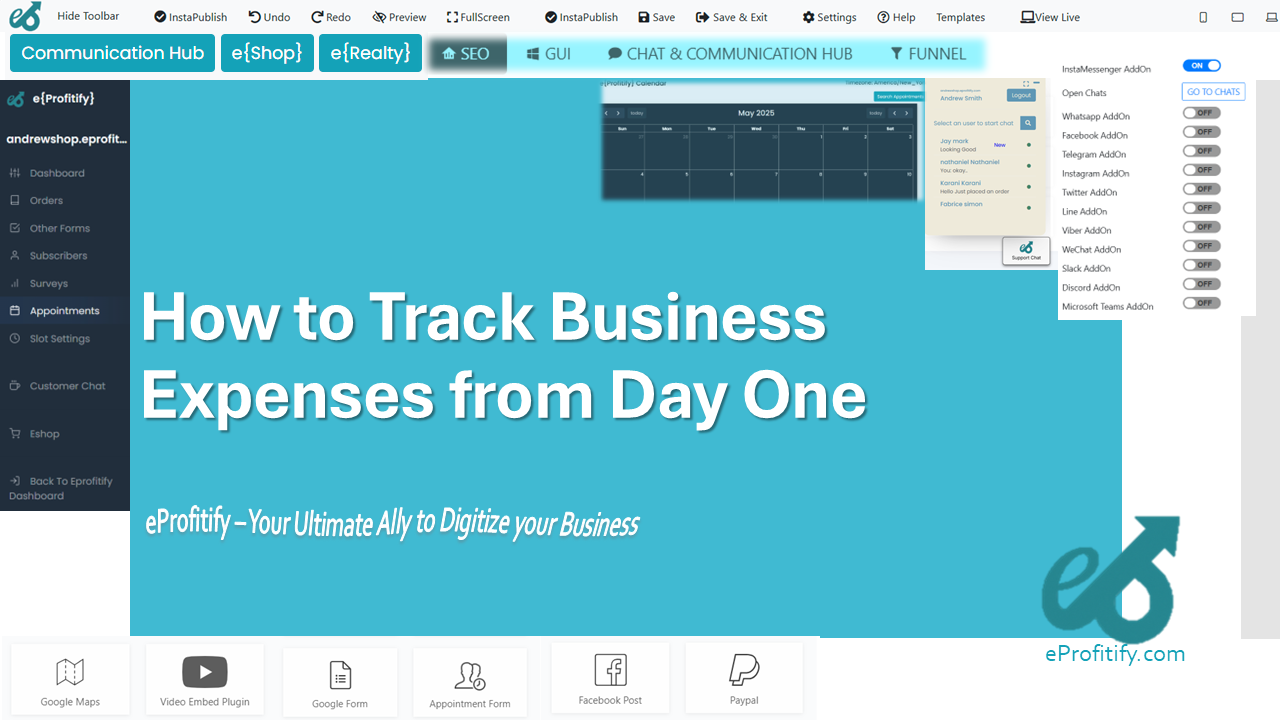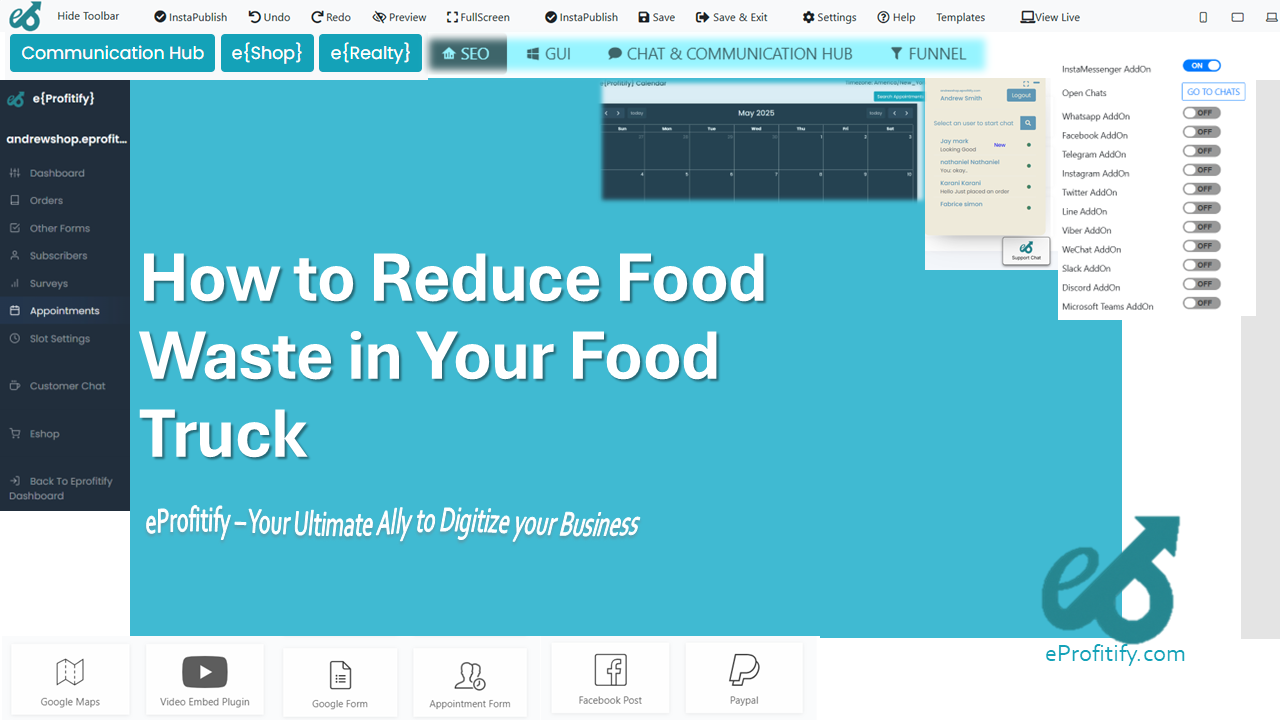Schedule content changes ahead using eProfitify tools
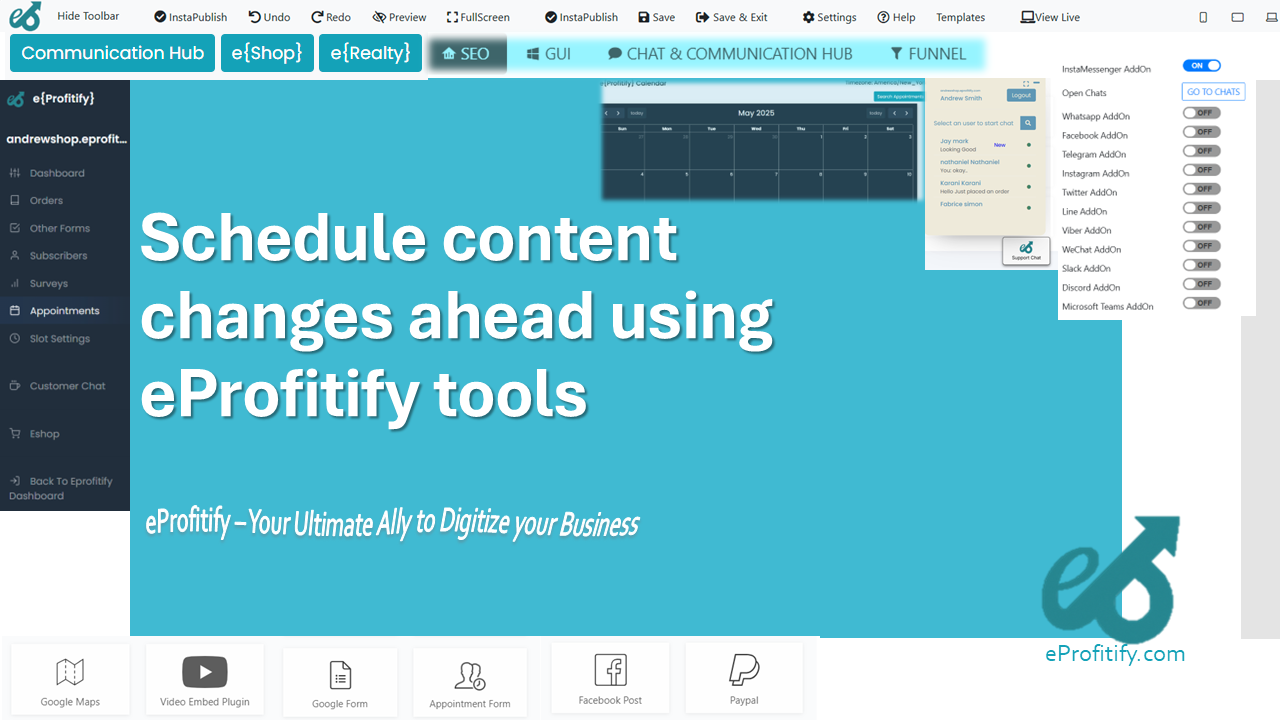
Schedule a LIVE Zoom call with an eProfitify Expert.
Mastering Content Scheduling and Beyond: How eProfitify Transforms Website Management
In today’s fast-paced digital landscape, consistently publishing fresh, relevant content is critical for businesses to stay competitive. However, managing a content calendar, collaborating with teams, and integrating e-commerce or customer relationship management (CRM) tools can quickly become overwhelming. This is where eProfitify, a leading website publishing and management platform, steps in. With its robust suite of features—including advanced content scheduling, instant messaging, appointment management, e-commerce integration, CRM, and analytics—eProfitify empowers businesses to streamline operations and maximize efficiency. In this article, we explore how its tools simplify content scheduling and elevate overall digital strategy, backed by compelling statistics that underscore their transformative potential.
The Importance of Scheduling Content Ahead: Why It Matters
Content is the backbone of digital marketing. According to HubSpot, businesses that publish 16+ blog posts per month generate 3.5x more traffic than those publishing fewer than four. However, manually posting content in real-time is unsustainable. Scheduling content in advance ensures consistency, reduces last-minute stress, and aligns publishing with strategic goals like product launches or seasonal campaigns.
Studies reveal that 68% of marketers prioritize organized content calendars to maintain brand visibility. Yet, only 40% of businesses leverage automation tools for scheduling, often due to fragmented workflows or lack of integration with other systems. This gap highlights the need for platforms like eProfitify, which centralizes scheduling while unifying complementary tools.
eProfitify’s Content Scheduling: Precision Meets Simplicity
eProfitify’s content scheduling tools are designed for agility and foresight. Users can:
- Plan Months in Advance: Map out blogs, social media posts, and product updates on an intuitive drag-and-drop calendar.
- Auto-Publish Across Platforms: Sync content to websites, blogs, and social channels like Facebook, Instagram, and LinkedIn without manual intervention.
- Edit on the Fly: Modify scheduled posts in real time, ensuring content remains relevant amid changing trends.
For example, a retail brand can pre-schedule Black Friday promotions months ahead while adjusting discounts or inventory alerts as needed. This proactive approach reduces errors and secures timely delivery—a key advantage when 43% of consumers cite inconsistent posting as a reason to disengage with brands.
Beyond Scheduling: eProfitify’s Integrated Toolkit
What sets eProfitify apart is its seamless integration of tools that complement content scheduling, creating a holistic ecosystem for business growth.
1. Instant Messaging for Seamless Collaboration
Remote teams thrive on communication. eProfitify embeds real-time instant messaging within its interface, allowing writers, designers, and marketers to collaborate without switching apps. For instance, a team member can flag a scheduling conflict in the content calendar and resolve it via chat instantly. This reduces delays, as 86% of employees blame workplace failures on poor collaboration.
2. Appointment Management System
For service-based businesses, coordinating client appointments manually is error-prone. eProfitify’s automated appointment management tool syncs with calendars, sends reminders, and even collects pre-session information. A yoga studio, for example, can schedule class announcements alongside booking confirmations, ensuring content and operations stay aligned.
3. E-commerce Integration
Content drives sales, but linking blogs or videos to products can be cumbersome. eProfitify bridges this gap by integrating e-commerce functionalities directly into its platform. Users embed product catalogs, track inventory, and auto-update promotions within scheduled posts. When a fashion retailer launches a new collection, the platform can publish launch content while adjusting product listings in real time—no coding required. Statistics show that 49% of consumers prefer shopping via integrated social commerce tools, making this feature invaluable.
4. CRM Capabilities
eProfitify’s built-in CRM tracks customer interactions, enabling businesses to personalize scheduled content. For example, an email campaign can be tailored based on a client’s purchase history or engagement patterns. According to Salesforce, 84% of customers say personalized experiences are key to earning their loyalty.
5. Analytics & SEO Optimization
Scheduling is futile without performance insights. eProfitify offers real-time analytics on content reach, engagement, and conversion rates. Users can A/B test headlines, optimize SEO metadata, and tweak schedules to post when audiences are most active—boosting visibility. Did you know 70% of marketers actively invest in SEO? With eProfitify, keyword tracking and backlink analysis are simplified.
Industry Statistics: The Case for Automation
The numbers speak volumes about why platforms like eProfitify are indispensable:
- Companies using automation tools see a 451% increase in qualified leads (HubSpot).
- 77% of marketers credit automation with improved targeting and ROI (Salesforce).
- Automating repetitive tasks saves businesses 6+ hours per week—time better spent on strategy (Smartsheet).
- 53% of shoppers abandon purchases due to poor website performance, underlining the need for integrated solutions (PwC).
By combining scheduling with CRM, e-commerce, and analytics, eProfitify addresses these pain points holistically.
Why eProfitify Leads the Pack
While tools like WordPress or Shopify excel in specific areas, eProfitify’s strength lies in unifying disparate functions under one roof. A small business owner, for example, can manage their blog, online store, client appointments, and team chats without juggling multiple subscriptions. This consolidation not only saves costs but also ensures data consistency. Forrester reports that 64% of firms using integrated platforms outperform competitors in customer retention.
Furthermore, eProfitify’s user-friendly interface democratizes advanced tools for non-technical users. Whether scheduling a product launch or analyzing campaign metrics, the platform empowers teams to focus on creativity rather than logistics.
Conclusion: Future-Proof Your Strategy with eProfitify
In an era where 4.66 billion people rely on the internet daily, businesses cannot afford inefficiencies. eProfitify’s content scheduling, paired with its robust ecosystem of tools, offers a future-proof solution. By automating workflows, fostering collaboration, and bridging content with commerce, it transforms how brands engage audiences.
As digital landscapes evolve, platforms that prioritize integration and simplicity will lead. For businesses aiming to scale sustainably, eProfitify isn’t just a tool—it’s a strategic partner.
Ready to revolutionize your content strategy? Explore eProfitify today and unlock the full potential of scheduled success.
Statistics Sources: HubSpot, Salesforce, Content Marketing Institute, PwC, Smartsheet, Forrester.
